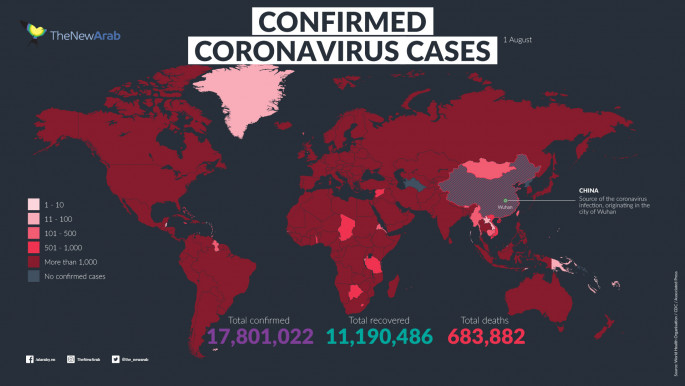The Middle East at war with coronavirus: Top stories from 23 April
Oil prices soared Thursday as escalating tensions between the US and Iran in the crude-rich Gulf lent support to markets battered by a coronavirus-triggered demand shock and concerns about storage.
Brent crude, the international benchmark, rose 11.8 percent to $22.79 a barrel in Asian afternoon trade.
US benchmark West Texas Intermediate jumped 14.37 percent to $15.76 a barrel, extending big gains from a day earlier.
Still, prices remain at multi-year lows as lockdowns and travel restrictions to fight the virus batter demand and storage facilities are overwhelmed by excess supply.
2. Rights groups concerned over HIV patients' access to medication in EgyptHospitals in Egypt are being turned into coronavirus testing centres, endangering the lives of HIV patients who must go there to collect essential medication.
On 9 March, the government designated the country’s fever hospitals as testing centres, and Egyptians living with HIV told Human Rights Watch (HRW) that they are "too fearful" to go there to get their medication for fear of contracting coronavirus.
"The government of Egypt should remove any obstacles to access to treatment for people living with HIV," said Joe Stork, deputy Middle East and North Africa director at Human Rights Watch.
"The government should ensure that people already facing health concerns can get their medication safely."
3. Turkey celebrates 100th year of parliament
A Turkish Airlines plane flew over the country on Thursday making the shape of the country's flag with its flight path to mark centennial celebrations for the founding of Turkey's parliament.
|
Flight tracking website Flightradar24 showed a crescent and a star over Turkey outlined by a Boeing 777 in celebration of the occasion, while Turkish television stations showed children with flags on their neighbourhood streets.
The anniversary of the founding of the Turkish National Assembly, which occurred during the country's war of independence against foreign occupying powers, was dedicated to children by the republic's founder Mustafa Kemal, widely known as Ataturk.
4. Global remittances could plunge $100 billionGlobal remittances could plunge $100 billion due to an expected global financial crisis, low oil prices, and coronavirus epidemic which has seen demand for services and commodities drop.
Job losses and freezes due enforced since the coronavirus epidemic could cause a 20 percent drop in remittances from low and middle-income economies, the World Bank reported on Wednesday, causing an unprecedented fall in remittances from expatriate workers.
This would see remittances fall from from $554 billion to $445 billion, according to the World Bank.
"If we are expecting a fall of 20 percent it's going to be a huge shock, it’s going to cause a lot of hardship for countries in terms of macroeconomic management and balance of payments difficulties," Dilip Ratha, the World Bank's lead economist for migration and remittances told The Financial Times.
5. Musicians and artists join essential workers in Ramadan messageMusician and actor Riz Ahmed joined British artists, politicians and essential workers to film a message for Muslims during the holy month of Ramadan, asking them to continue following social distancing rules amid the coronavirus pandemic.
The 60-clip features a host of public figures, including Riz Ahmed, Konnie Huq, Naughty Boy, Asad Ahmed and Mayor of London Sadiq Khan asking British Muslims to "pray from home".
"This Ramadan I'm staying at home, to protect our doctors, nurses, to protect our NHS, to protect our superheroes," the video says, asking others to do the same.
 |





 Follow the Middle East's top stories in English at The New Arab on Google News
Follow the Middle East's top stories in English at The New Arab on Google News
![Israeli forces ordered bombed Gaza's Jabalia, ordering residents to leave [Getty]](/sites/default/files/styles/image_330x185/public/2176418030.jpeg?h=a5f2f23a&itok=_YGZaP1z)

